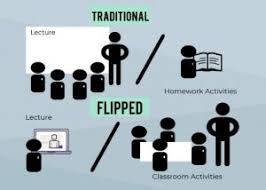By: Dr. Christian Hoffmann, Development Adviser
Basic Education Program, GIZ Guinea
November 13, 2022 – At the Teacher Training College in N’Zérékoré, a forested mountainous region in southeastern Guinea, the class of Monsieur Camara is studying in the solar-powered media room. For the beginning of today’s lesson, the education-sciences lecturer has prepared a Kahoot Quiz (https://kahoot.it/) to test the prospective teachers’ comprehension of the video tutorial that they were supposed to have studied in preparation. The students connect their own mobile phones to the college’s internal network, open the application and off they go with the quiz. In less than five minutes, Mr. Camara has evaluated and archived their performance. After a short phase for clarification of some open questions concerning the content of the video, he can start immediately with the application of the newly acquired knowledge.
Bring your own device – BYOD
Allowing students to bring their own devices to a lesson has many advantages, both for them and for the institution. Students are already familiar with their own devices, so they do not have to spend time learning how to use them. Furthermore, the college can reduce high technical equipment costs.
What sounds like science fiction today, in 2019, especially in the context of Guinea’s underfunded education sector, could soon become reality, at least in some pilot teacher- training classes. The digital and didactic revolution does not require much more than a few infrastructural upgrades and pedagogical-training units. Most important, however, is the commitment of the pedagogical and administrative staff of the state institutions involved; students will certainly be easily persuaded.
What exactly does the so-called “flipped classroom” approach involve, and how does it relate to the use of digital media?

“Flipping the classroom” means that students gain their knowledge input through self-study units outside of class so that class time can be used for applying that knowledge, e.g. through problem solving, simulations, or debates. At the beginning of the lesson, lecturers often use assignments (such as quizzes) to help ensure that students come to class prepared. This model contrasts with the traditional model, in which the knowledge transfer takes place via lecture in the classroom, with students assimilating knowledge through homework; hence the term “flipped classroom”. From the college’s server, students can download their digital study materials, such as eReaders and video tutorials, free of charge onto their own devices. Outside the college, they can study the learning material at their own pace – without having to use an expensive internet connection.
Why could the “flipped classroom” concept be successful, especially in Guinea and other countries in Sub-Saharan Africa?
For various reasons, in many sub-Saharan African countries, many students face a great challenge in reading comprehension in the official and academic languages (mostly English, French, or Portuguese). In Guinea, for example, only a small percentage of the population speaks French as their mother tongue (source – La Francophonie dans le monde 2002-2003, Paris, 2003). On the other hand, many African languages have a living tradition of oral narration.
Oral history is a form of West African oral tradition. It is the recording, preservation and interpretation of historical information, based on the storyteller’s personal experiences and opinions. It often takes the form of eye-witness account about past events, but can include folklore, myths, songs and stories passed down over the years by word of mouth. (source: www.watchousten.org)
Through the creation of digital teaching materials such as video tutorials by national training personnel or even by fellow students, Guinean students could have new opportunities to learn from each other. Apart from that, video tutorials offer a contemporary way of learning and many students also simply enjoy watching videos.
Prospects
The opportunities offered by digitalization in Guinea’s education sector are very promising. In the future, using open-source learning platforms like Moodle (https://moodle.org/) could offer Guinean students the opportunity to network with the international (or at least the French-speaking) learning community. Pedagogical problems are similar in sub-Saharan African countries, and digital learning can help overcome political boundaries and strengthen synergies in the education sector of the sub-region.
The practical challenges along the way, such as improving the technical infrastructure of the TTC and developing the skills of the teaching staff in producing video tutorials and integrating them into new teaching concepts, can be met through joint efforts by the Guinean government and external funders. While there are many opportunities in digitalization, the most important prerequisite for success is that the government and its subordinate education authorities must own and lead the effort.
Dr Christian Hoffmann will be speaking at eLearning Africa 2019.
Don’t miss out on the chance to participate and discuss with him, Joseph Hoffman and Dimitrios Noukakis on the topic of Digital Literacy for Teachers and Trainers on Friday, 25 October 2019.
Take a look at the rest of the programme here.



















Wawoo this is very interesting it helps the learners do more work on there own.I is a good innovation if the educationist. Would embrace it.